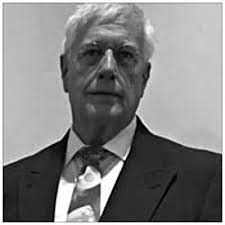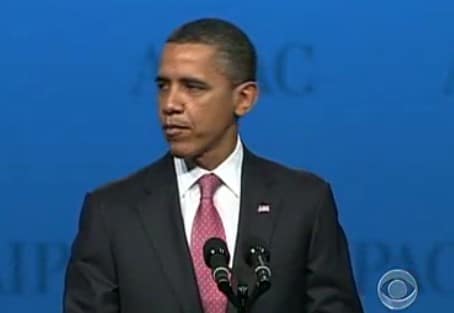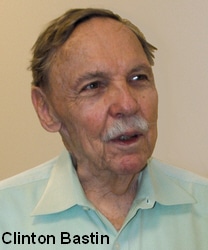Press Lies About Key Areas Of President’s Talk
After hours of the usual AIPAC drivel, a presidential speech in the midst of an AIPAC spying trial, Obama made a plea for as much Jewish support, votes and money as possible, promising everything Israel demanded.
Then, in the end, he took it all all away, warning that “war talk” was irresponsible and that the US would seek a diplomatic solution.
What did he really say:
- War is off the table
- Sanctions have to be allowed to go forward
- Loose talk about war is unacceptable
- No attacks are planned or prepared for
In a talk about this today on live on Press TV’s International Service, VT’s Senior Editor, Gordon Duff, predicted this election year performance. Video will be included as soon as available.
In the midst of the controversy, VT published the transcript of an interview with former Nuclear Weapons expert Clinton Bastin, advisor to VT, who briefed both Netanyahu and President Obama on Iran’s nuclear weapons program as he had on India’s and North Koreas.
Bastin simply sites that IAEA inspectors have no weapons knowledge and seem to be tasked with misidentifying medical engineering programs that are not weapons oriented as something else. He calls them “political.”
Bastin: It’s a nuclear power program. Iran made a commitment to full use of nuclear power in 1970, ordered five nuclear plants from the United States, which promised, but later denied, reprocessing technology. This resulted in Iran’s cancelling the U.S. plants and ordering them from others, which were cancelled during the revolution.
But Iran has stayed committed to nuclear power. Russia is building Iran’s nuclear plant, which is ready to start operation.
Because of the denial of reprocessing, Iran is reluctant to rely on others, so they wanted to enrich their own uranium, which is essential for nuclear power. That’s what they’re doing. Their reactor is a U.S.-type light water reactor. The Russians started building them successfully,and I think it’s fine.
I believe Pakistan provided the gas centrifuges, which have had problems. I was a member of the Atomic Energy Commission’s steering committee for gas centrifuge development, and I know that they are very sensitive, run at high power, and often crash. I suspect problems are related to that, and not computer hacking.
Iran also has a research reactor, Osiris, which was built by the French and uses 20% enriched uranium,
which they’ve been getting from others and would like to make themselves. Twenty percent is not weapons material. Weapons material is about 90%.David Albright has been claiming that you can make a weapon with it, but it would be incredibly difficult, and it’s not a rational thing to try.
Iran Cannot Make a Nuclear Weapon
…A gun-type weapon would require several tons of highly enriched uranium, and wouldn’t make sense. Anyway, that’s not a real concern under these circumstances.
To make a bomb, Iran would not only have to further enrich the uranium in its existing facilities—which would be difficult to do—but after they complete further enrichment, they would have to convert the gas to metal. Iran doesn’t have the facilities or experience to do that. It would take years. The most important thing to realize is that any diversion of uranium for further enrichment or anything else would be immediately detected.
It’s very easy to detect diversion from a gas centrifuge facility.
the only thing that you cancount on to make sure that nobody’s building weapons.
The nonsense of drawings of this, or drawings of that—it’s really just nonsense. ElBaradei, the former IAEA director general, recognized this and he said, during our conversation, that no, there was no threat from Iran’s nuclear power program.
21st Century: You’ve criticized the IAEA report’s claim on Iran’s nuclear program as incompetent. Can you give some examples of this?
Bastin: Yes, that’s what’s going on right now. The IAEA director general now—I guess he’s a political person, I don’t really know. I’ve looked at some things about him, and it sounds like he’s been more like a political person. I think some people come in, as in the Department of Energy, and they accept everything that people tell them. And I think he’s come in, and believes all those inspectors that have seen things, have found things, that they shouldn’t really—they have long trigger lists of things to look for, and it misleads them. The inspectors don’t really know anything about nuclear weapons production, but they have this long list of items that are mostly normal chemical engineering type processes, used in operations, or similar things that they’ll run into.
Now, on the drawings: I’m sure in Iran that there are people who are upset about everything—you know, they have lots of problems as a country. The drawings, I’m sure, are made by people that are sort of ticked off, here, there, and yonder. Drawings for a weapons program:
I had all the drawings in the Atomic Energy Commission for all weapons. Nobody ever sees those except
people I want to see them. The drawings the inspectors have seen are something that somebody has played with.
(On falsified weapons drawings)
…Drawings of assembling a hypothetical nuclear weapon with a missile are particularly unrealistic. I’ve watched U.S. nuclear warheads being attached on missiles for the U.S. weapons. You have to know what the weapon looks like. You can’t build a hypothetical weapon in a meaningful way, and put it on a hypothetical missile, or even a real missile, if you don’t know what everything looks like. The whole thing is stupid. It’s sort of stupid, and when I say they’re ignorant, it’s really worse than that.
‘Nobody Knew Anything’
(On Inspectors)
They are trained to detect the diversion of nuclear material, and that’s what they do. But they’re also given a list of things to look for, that suggest weapons activities. But the IAEA doesn’t have people who know about nuclear weapons. They don’t build nuclear weapons. I’ve never met anybody—and I’ve been to the IAEA many, many times—and I’ve never met anybody who knows anything about nuclear weapons.
That’s also the problem in Washington, D.C. For the 25 years I was there, when involved with nuclear weapons business, with interagency and other committees, nobody knew anything about what I was telling them. It was interesting at times. Once I met at the Department of State with a group involved with concerns about nuclear programs in India. I was asked to go to India and take a look and made a report. The representative from the Arms Control and Disarmament Agency said, “We’ve been looking at this problem for four years, and it looks like we now finally know what we’re talking about.”
That’s the reality in the U.S., the reality in the UN,and the reality almost everywhere—except perhaps Russiaand China. I spent a week with the Minister of Nuclear Energy in Russia and a lot of other leaders, and I think they know more about what they’re dealing with. And I imagine that China does too.
But our system is dysfunctional.
You know, the Department of Energy has lost the ability to produce nuclear materials, because they didn’t really know about things. It’s really awful.
(quotes from his interview with 21st Century Scientist)
21st Century: That’s not comforting—
Bastin: Yes! Iran is just one of many that I’ve focused on, and I’m very much interested in it because it has awful potential consequences if somebody attacks them.
21st Century: Absolutely. I know that you wrote a detailed letter to the Israeli Prime Minister, Netanyahu, about Iran’s nuclear weapons, or lack of such. Have you had a response?
Bastin: Yes, let me elaborate on this: I started three years ago with the Consul-General of Israel in Atlanta.
I sent e-mail messages, and in March 2009, we had detailed discussions. I’m sure everything I said was sent to Tel Aviv, and I feel 100% certain that he knew I knew what I was talking about.
I sent some of the information to President Obama, and I got a call from the FBI office in Atlanta saying that they wanted to meet with me. The White House referred me to the FBI weapons of mass destruction unit, and they asked to meet with me to verify that this information was valuable. After my meeting with the Consul-General, there was an article about a statement made by Netanyahu to Ahmadinejad of Iran that Iran’s nuclear programs for weapons are meant to kill Jews, just like Hitler’s in World War II.
I sent an e-mail message to Netanyahu that Germany didn’t have a nuclear weapons program in World War II; they had a nuclear program, but their scientists never focussed on the idea of a nuclear explosion.
That’s from the book Alsos by Samuel Goudsmit, who was the principal scientist for the Alsos (Greek word for Groves), the project that looked into nuclear work that Germany was doing. When German scientists found out about the U.S. nuclear weapons, they went into shock because they couldn’t believe that the U.S. scientists could do something that they had never been able to figure out at all. Fascinating book!
“We acknowledge receipt of your e-mail to Prime Minister Benjamin Netanyahu, the contents of which have been duly noted”—was the response to my information to Prime Minister Netanyahu. They didn’t say they were going to do anything, but I remember, after one particular message, the next thing I heard from the White House, was that Israel had stopped making threats. The White House information said that it was because of trouble with the gas centrifuges, but my feeling is that they knew that the information that I was providing is sound. And so did the FBI.
I’ve written to the Senators from Georgia, and all I get is the rhetoric and folderol and so forth, which doesn’t have a damn thing to do with whether Iran can make a nuclear weapon. They cite all the things the inspectors say. The IAEA inspectors were saying the same things that they were saying when ElBaradei was there, but ElBaradei recognized that they were not valid concerns. They were not then, and they are not now.
Don’t Listen to Know-Nothings
21st Century: So you think ElBaradei had more sense about the situation?
Bastin: He had more sense about the reality of things in this situation. I enjoyed him and liked his approach. He got the Nobel Peace Prize. I was union president at Department of Energy headquarters, and had interaction with secretaries of energy. Most of them would get information from the know-nothings and go you gotten from the nuclear community for your campaign?
Bastin: Good question. After U.S. officials determined there was a weapon threat in Iran, Nuclear News, the monthly magazine of the American Nuclear Society, published my letter that the idea that Iran was a nuclear weapon threat belongs on the same shelf as the notion that 1 rad of radiation to 1,000 people would mean the death of one of those people—the linear no threshold hypothesis.
21st Century: I think so, and for the reason that all of the so-called experts in the press, as you have pointed out, are really not experts in this technical area.
Bastin: I mentioned to David Albright that Pakistan’s gun-type weapons require about 50 kilograms of highly enriched uranium, and that the numbers that appear in the newspaper are probably high. He said Pakistan’s weapons are implosion-type, not gun-type, and have solid metal components. I said, “Wait a minute, David, you know better than that.” I laughed.
He got mad and cut me off, and we are no longer colleagues.
An implosion-type weapon is a hollow sphere of plutonium or uranium metal, surrounded by high explosives with detonators on the outside. The explosion squeezes the nuclear material into a tiny ball, which be comes supercritical and explodes with great force. But explosives will not squeeze solid metal. David’s comment wasn’t just technically invalid, it was stupid.
A gun-type weapon consists of two solid chunks of metal, one a cylinder, the other with a hole the size of the cylinder. The cylinder is driven into the other chunk, and boom!
21st Century: But it takes a lot more of the enriched uranium.
Bastin: The implosion weapon is a hollow sphere or spheroid, surrounded by explosives, with detonators on the outside, all contained within a strong structure. So all the force squeezes the hollow sphere into a tiny ball, a very small and very highly critical mass, and it makes a big explosion. And you can’t do it with solid metal, because it won’t squeeze.
21st Century: Was your point with Albright that Pakistan did not have the technology to do an implosion- type weapon?
Bastin: Yes. They are much more difficult to make, have to be tested prior to use. The Manhattan Project had to test the implosion weapon at Alamogordo, before it could be declared usable, whereas the gun-type weapon was used at Hiroshima without any testing. The implosion-type is a much more sophisticated, complex weapon.
The Israeli weapons are the implosion type, but are of French design. The French helped the Israelis with their weapons program. India’s is also an implosion type, but it took them a long time, and they’ve gotan awful lot of very, very smart physicists and others in India. It took a long time, and I understand that they had some failed tests before they were successful.
Full interview at 21rst Century is here.
Let’s hope that Bastin and Jim Dean’s efforts in passing on the real dialog, the real science, getting past the lies of the press will begin to receive the recognition and appreciation needed at this critical time.
What you have read above is normally classified. Bastin had a stroke recently and is recovering.
We wish him our best.
What we can and do prove is the truth, directly from the most competent and authoritative technical sources, the same sources that brief President Obama, that have tried for several years to, not just reason to Netanyahu but have reeled in shock at his betrayal of the facts he is so aware of.
We print what is necessary, what is safe. We go no further. We oppose the war and we can prove, beyond a doubt, we have access to the highest levels of national intelligence, of weapons design, of world nuclear capability from Bastin and others.
We have access to all of them.
Bastin, in particular, is a man of honesty, intellect and responsibility. We thank him for his efforts.
We thank Jim Dean for his friendship with Clinton Bastin and his efforts to bring us these critical facts denied the American people by a criminally complicit press.
We thank President Obama for what seems to be “double talk” and hope we saw the signs of intellect, honor and judgement, albeit hidden, among his worlds of confusion, disinformation and dishonor.

Gordon Duff posted articles on VT from 2008 to 2022. He is a Marine combat veteran of the Vietnam War. A disabled veteran, he worked on veterans and POW issues for decades.
Gordon is an accredited diplomat and is generally accepted as one of the top global intelligence specialists. He manages the world’s largest private intelligence organization and regularly consults with governments challenged by security issues.
Duff has traveled extensively, is published around the world, and is a regular guest on TV and radio in more than “several” countries. He is also a trained chef, wine enthusiast, avid motorcyclist, and gunsmith specializing in historical weapons and restoration. Business experience and interests are in energy and defense technology.
ATTENTION READERS
We See The World From All Sides and Want YOU To Be Fully InformedIn fact, intentional disinformation is a disgraceful scourge in media today. So to assuage any possible errant incorrect information posted herein, we strongly encourage you to seek corroboration from other non-VT sources before forming an educated opinion.
About VT - Policies & Disclosures - Comment Policy





